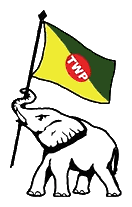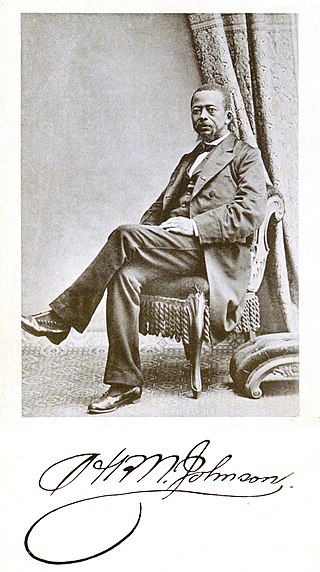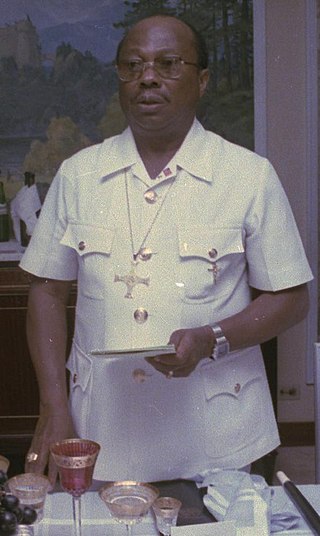
Liberia is a country in West Africa founded by free people of color from the United States. The emigration of African Americans, both freeborn and recently emancipated, was funded and organized by the American Colonization Society (ACS). The mortality rate of these settlers was the highest among settlements reported with modern recordkeeping. Of the 4,571 emigrants who arrived in Liberia between 1820 and 1843, only 1,819 survived (39.8%).

The Politics of Liberia takes place in a framework of a presidential representative democratic republic modeled on the government of the United States, whereby the President is the head of state and head of government; unlike the United States, however, Liberia is a unitary state as opposed to a federation and has a pluriform multi-party system rather than the two-party system that characterizes US politics. Executive power is exercised by the government. Legislative power is vested in both the government and the two chambers of the legislature.
The Whig Party was a conservative political party that existed in the United States during the mid-19th century. Alongside the slightly larger Democratic Party, it was one of the two major parties in the United States between the late 1830s and the early 1850s as part of the Second Party System. Four presidents were affiliated with the Whig Party for at least part of their terms. Other prominent members of the Whig Party include Henry Clay, Daniel Webster, Rufus Choate, William Seward, John J. Crittenden, and John Quincy Adams. The Whig base of support was centered among entrepreneurs, professionals, planters, social reformers, devout Protestants, and the emerging urban middle class. It had much less backing from poor farmers and unskilled workers.

The president of the Republic of Liberia is the head of state and government of Liberia. The president serves as the leader of the executive branch and as commander-in-chief of the Armed Forces of Liberia.

Joseph Jenkins Roberts was an Americo-Liberian merchant who emigrated to Liberia in 1829, where he became a politician. Elected as the first (1848–1856) and seventh (1872–1876) president of Liberia after independence, he was the first man of African descent to govern the country, serving previously as governor from 1841 to 1848. He later returned to office following the 1871 Liberian coup d'état. Born free in Norfolk, Virginia, Roberts emigrated as a young man with his mother, siblings, wife, and child to the young West African colony. He opened a trading firm in Monrovia and later engaged in politics.

The True Whig Party (TWP), also known as the Liberian Whig Party (LWP), is the oldest political party in Liberia and one of the oldest parties in Africa. Founded in 1869 by primarily darker-skinned Americo-Liberians in rural areas, its historic rival was the Republican Party. Following the decline of the latter, it dominated Liberian politics from 1878 until 1980. The nation was virtually governed as a one-party state under the TWP, although opposition parties were never outlawed.

Edward James Roye served as the fifth president of Liberia from 1870 to his overthrow in the 1871 Liberian coup d'état and subsequent death. He had previously served as the fourth Chief Justice of Liberia from 1865 until 1868. He was the first member of Liberia's True Whig Party to serve as president.

Charles Dunbar Burgess King was a Liberian politician who served as the 17th president of Liberia from 1920 to 1930. He was of Americo-Liberian and Sierra Leone Creole descent. He was a member of the True Whig Party, which ruled the country from 1878 until 1980.

General elections were held in Liberia on 15 October 1985. They were the first elections since the 12 April 1980 military coup that brought Samuel Doe to power. During 1984, a new draft constitutional was approved in a referendum, which provided for a 58-member civilian and military Interim National Assembly, headed by Samuel Doe as president. After a ban on political parties was lifted, four parties – Doe's National Democratic Party (NDP), the Liberian Action Party, the Unity Party and the Liberia Unification Party – contested the elections.
Gabriel Bacchus Matthews was a Liberian politician. He is considered one of the leaders in developing a multi-party system in Liberia, long dominated by the True Whig Party. He founded the Progressive Alliance of Liberia (PAL) in 1975, the first active opposition party since the demise of the Republican Party.

William David Coleman was an Americo-Liberian politician. A True Whig Party member, he served as the 13th president of Liberia from 1896 to 1900. Born in Fayette County, Kentucky, United States, he emigrated to Liberia in 1853. In 1877, he was elected to the House of Representatives and served as Speaker of the House of Representatives until 1879. Later he served in the Senate and then as vice president before assuming the presidency when Joseph James Cheeseman died in office.

Hilary Richard Wright Johnson served as the 11th president of Liberia from 1884 to 1892. He was elected four times. He was the first Liberian president to be born in Africa. He had served as Secretary of State before his presidency, in the administration of Edward James Roye.

The vice president of the Republic of Liberia is the second-highest executive official in Liberia, and one of only two elected executive offices along with the president. The vice president is elected on the same ticket with the president to a six-year term. In the event of the death, resignation or removal of the president, the vice president ascends to the presidency, and holds the position for the remainder of their predecessor's term. The vice president also serves as the president of the Senate and may cast a vote in the event of a tie. The current vice president is Jeremiah Koung, serving under president Joseph Boakai. He began his term on January 22, 2024.

General elections were held in Liberia in May 1871.

General elections were held in Liberia in May 1881. The presidential election resulted in a victory for incumbent President Anthony W. Gardiner of the True Whig Party against Republican nominee Joseph James Cheeseman.

General elections were held in Liberia in 1927. In the presidential election the result was a victory for Charles D. B. King of the True Whig Party, who was re-elected for a third term after defeating Thomas J. R. Faulkner of the People's Party.

General elections were held in Liberia on 7 October 1975, alongside a simultaneous referendum on presidential term limits. In the presidential election, incumbent William Tolbert of the True Whig Party was the only candidate, and was re-elected unopposed. In the legislative elections True Whig Party candidates won all 74 seats in the House of Representatives unopposed. Voter turnout was around 80%.

The 1980 Liberian coup d'état happened on April 12, 1980, when President William Tolbert was overthrown and murdered in a violent coup. The coup was staged by an indigenous Liberian faction of the Armed Forces of Liberia (AFL) under the command of Master Sergeant Samuel Doe. Following a period of transition, Doe ruled Liberia throughout the 1980s until his murder in 1990 during the First Liberian Civil War.

Americo-Liberian people, are a Liberian ethnic group of African American, Afro-Caribbean, and liberated Africans. Americo-Liberians trace their ancestry to free-born and formerly enslaved African Americans who emigrated in the 19th century to become the founders of the state of Liberia. They identified themselves as Americo-Liberians.
The 1871 Liberian coup d'état, also known as the Roye affair, resulted in the overthrow and death of President Edward James Roye of the True Whig Party and his eventual replacement by Joseph Jenkins Roberts of the Republican Party.












